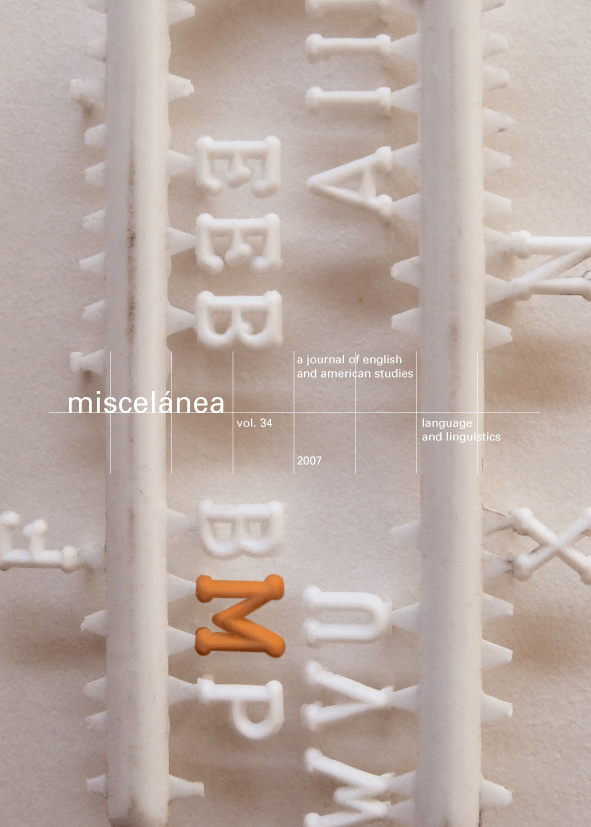Looking Forward to the End. /Ou Topos/: An Approach to the Art of Samuel Beckett
DOI:
https://doi.org/10.26754/ojs_misc/mj.200610107Palabras clave:
Beckett, Literatura, Utopía, Filosofía, Historia/mitoResumen
Una de las paradojas que plantea la obra de Beckett, como la de Arthur Schopenhauer, de cuya filosofía se nutre este irlandés universal, es que, tal vez, la negación sea el único camino que le quede al ser humano para recobrar la serenidad perdida, por no hablar de inocencia. Para Beckett, sin embargo, la negación es espera: el único topos que nos queda después del fracaso de la andadura humana a nivel ontológico: ya nos hemos pateado una historia, ahora tal vez podamos retornar al mito para empezar un nuevo y más prometedor viaje hacia nosotros mismos.
Como sus antepasados en la obra de Milton, Adán y Eva, los personajes de Beckett viajan de dos en dos. Ahora, maltrechos y sin memoria, esperan a las puertas de la Utopia de la cual fueron expulsados.
Se niega el lenguaje para convertirlo en letanía con visos de oración. La acción se paraliza, el ser se despoja de todo lo que le impidió permanecer en el Paraíso.
Quizás, la puerta se abra de nuevo. Sólo quizás.
Pero la esperanza sigue latiendo.
Descargas
Referencias
BECKETT, Samuel. 1958. Endgame. New York: Grove Press. Written in French in 1956. First published in French as Fin de partie in 1957. Paris: Les Editions de Minuit.
—. (1984) 1985. All That Fall. In Collected Shorter Plays. London: Faber & Faber. Written in 1956. First published in 1957. New York: Grove Press.
—. 1988. Waiting for Godot. London: Faber & Faber. Written in French in 1949. First published in French as En attendant Godot in 1952. Paris: Les Editions de Minuit.
BILLINGTON, Michael. 2006. “Rockaby/Ohio Impromptu”. The Guardian (Thursday, 23 March 2006).
BORGES, Jorge Luis. 1950. “La muralla y los libros”. In Jorge Luis Borges Borges. 1952. Otras inquisiciones. Buenos Aires: Sur: 9-12.
BRYDEN, Mary. 1988. Samuel Beckett and the Idea of God. London: Macmillan.
EAGLETON, Terry. 2006. “Champion of Ambiguity: The misinterpretations of Beckett’s work on his 100th anniversary would not have pleased him”. The Guardian (Monday, 20 March 2006).
GARCÍA LANDA, José Ángel. 1992. Samuel Beckett y la narración reflexiva. Zaragoza: Prensas Universitarias de Zaragoza.
JEWINSKI, Ed. 1990. “Beckett’s Company, Poststructuralism and Mimetalogique”. In Lance St. John Butler and Robin J.Davis. (eds.). Rethinking Beckett: A Collection of Critical Essays. London: Macmillan: 141-159.
KNOWLSON, James. (1996) 1997. Damned to Fame: The Life of Samuel Beckett. London: Bloomsbury.
MILTON, John. (1667) 1998. Paradise Lost. In John Leonard. (ed.). The Complete Poems. Harmondsworth: Penguin: 119-406.
SCHOPENHAUER, Arthur. (1819) 1975. Die Welt als Wille und Vorstellung. Ed. and trans. by David Berman. New York: AMS Press.
—. (1836) 1987. Über die Wille in der Natur. Trans. as Sobre la voluntad en la naturaleza by Miguel de Unamuno in 1970. Preface and notes by Santiago González Noriega. Madrid: Alianza Editorial.
Descargas
Publicado
Número
Sección
Licencia

Esta obra está bajo una licencia internacional Creative Commons Atribución-NoComercial 4.0.


